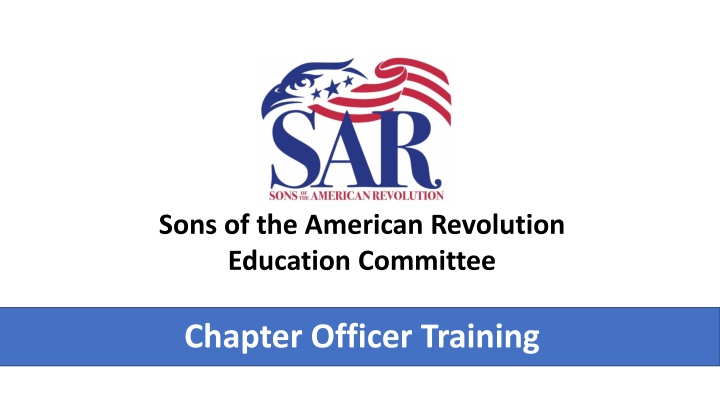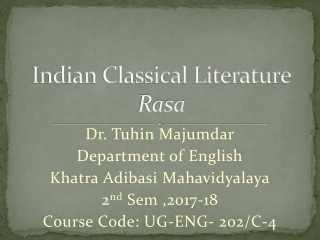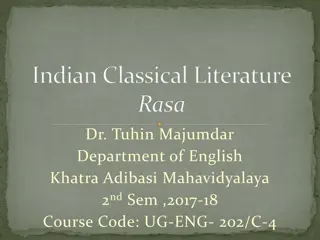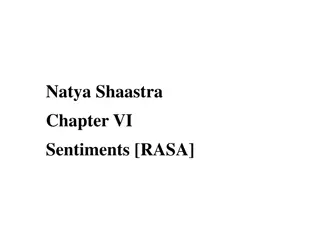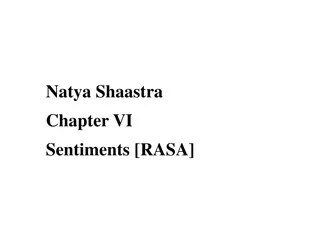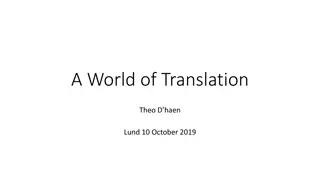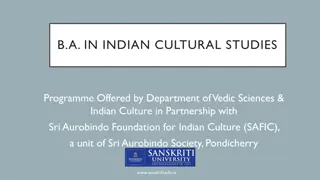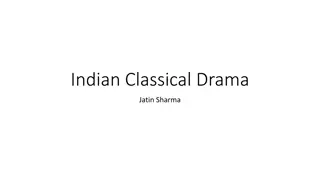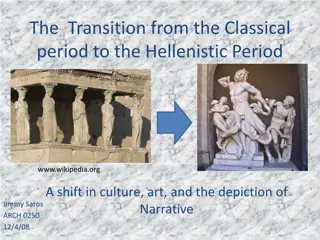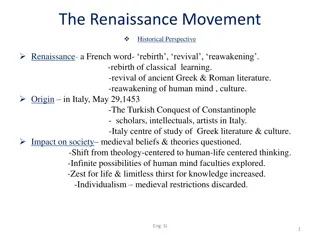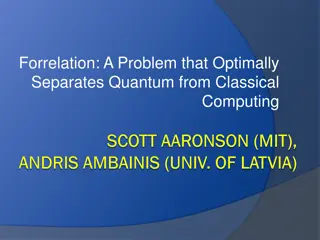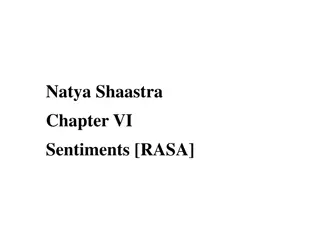Indian Classical Literature: Natyashastra and Rasa Concept
Natyashastra, a treatise on Indian dramaturgy by Bharatmuni, delves into the genesis of drama and the purpose of Natya in awakening Rasa in the audience. The concept of Rasa, with its Vibhavas and Sthayi-bhavas, forms the essence of poetry. Additionally, the Prakarana play style, exemplified in Mrichchhakatika by Sudraka, showcases original plots rooted in human experiences. Through a blend of creativity and cultural insights, Indian classical literature offers a rich tapestry of storytelling traditions.
Download Presentation

Please find below an Image/Link to download the presentation.
The content on the website is provided AS IS for your information and personal use only. It may not be sold, licensed, or shared on other websites without obtaining consent from the author.If you encounter any issues during the download, it is possible that the publisher has removed the file from their server.
You are allowed to download the files provided on this website for personal or commercial use, subject to the condition that they are used lawfully. All files are the property of their respective owners.
The content on the website is provided AS IS for your information and personal use only. It may not be sold, licensed, or shared on other websites without obtaining consent from the author.
E N D
Presentation Transcript
Sons of the American Revolution Education Committee Chapter Officer Training
Chapter Chaplain A Spiritual Guide to the Chapter
Duties of the Chapter Chaplain: Each chapter determines the duties of its Chaplain. NSSAR suggests that these duties include: Opening and closing each chapter meeting with a prayer Providing appropriate prayers at special meetings and activities Communicate, whenever possible, with members who are ill or in distress. Consulting with family and clergy concerning funerals and memorial services for deceased Compatriots. Reporting all member deaths to the State Chaplain.
Opening and Closing Prayers Invocations are usually given at the beginning of a meeting. They are an appeal for inspiration and guidance, and/or an offering of thanks. Benedictions are traditionally given at the end of a meeting and are an expression that promotes goodness and well-being.
Nondenominational SAR is a non-discriminatory, non-political, and non-denomination organization. Our chapters are comprised of members from a wide range of religious faiths, and for that reason it is recommended to use nondenominational meeting invocations, prayers and blessings that give no referral to beliefs of specific religions. Nondenominational prayers can call on God but not Jesus, Mohammed, or Buddha. For example, instead of ending a prayer with the phrase, in Jesus name one would substitute In your holy Name. Prayers can also be secular in nature. Secular prayers don t refer to a supreme being at all. Secular prayers would substitute lines such as God, we thank you for with the line We are thankful for or Let us be thankful
Resource There is a SAR Prayer Book available for purchase from the NSSAR which provides appropriate prayers for many different occasions. It is an excellent guide to nondenominational prayers.
Tips for Offering Prayers: Prayers should be brief. Use we rather than I. At a group event, you are speaking on behalf of everyone. Start with something like, Let us have a moment of reflection or Please join me in a moment of reflection and thanks Although it is acceptable to generally ask for wisdom in decision making or respect for opposing opinions, you should avoid referring directly to items on the agenda. Wrap up. A formal conclusion such as "Amen" ends things nicely.
Special Events and Activities Opening and closing prayers may be requested at special meetings, such as a George Washington Birthday Celebration, Veteran s Day Service, or Holiday Party. These prayers are usually tailored to the theme of the event. Flag Retirement Ceremonies traditionally involve the chaplain. The SAR Handbook, Volume IV available on the NSSAR website provides a suggested script to follow. Grave Marking ceremonies usually include remarks by a chaplain. The SAR Handbook, Volume IV available on the NSSAR website provides suggested phrasing.
Funerals and Memorial Services The SAR Handbook, Volume IV available on the NSSAR website provides suggested Funeral Rituals and Memorial Services for departed Compatriots. For compatriots who do not profess the Christian faith, the suggested ritual and the memorial service suggestions may quite properly be altered to conform to the applicable customs of the faith of the deceased.
Reporting Deaths The chapter chaplain should report all compatriot deaths to the state chaplain. Individual states may have additional reporting requirements, such as, to the state president, secretary, or registrar.
Chapter Chaplain Congratulations! You have completed The Chapter Chaplain s Training
